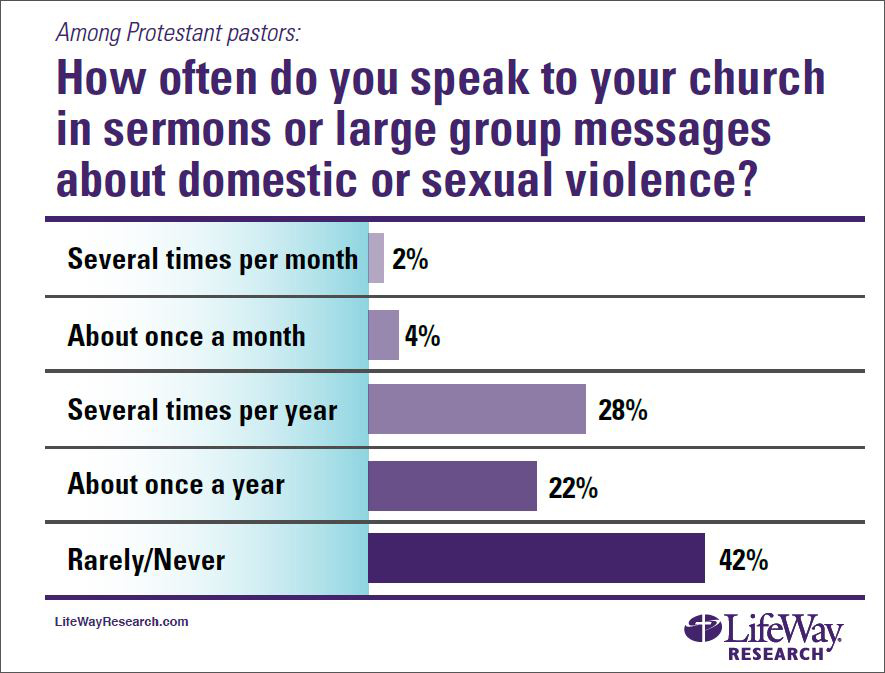
NASHVILLE (BP) — A new survey from LifeWay Research found most Protestant senior pastors say they know victims of domestic violence and believe stopping abuse is a pro-life issue. But, according to the study, those pastors seldom address domestic violence from the pulpit — and less than half have been trained in how to help victims.
Those are among the findings of a new telephone survey of 1,000 senior pastors of Protestant churches from LifeWay Research. The survey was co-sponsored by two Christian nonprofits: Washington, D.C.-based Sojourners and Maryland-based IMA World Health.
Sojourners president Jim Wallis said the survey shows churches can do more to address domestic violence.
“This is a conversation the church needs to be having but isn’t,” he said. “We cannot remain silent when our brothers and sisters live under the threat of violence in their homes and communities.”
The recent LifeWay Research pastor’s survey is one of the first of its kind on the topic of domestic violence.
Researchers found about 4 in 10 (42 percent) pastors “rarely” or “never” speak about domestic violence. Less than a quarter (22 percent) speak to their church about the issue once a year.
“When two-thirds of pastors address the issue of domestic violence in church one time a year or less, we have a serious disconnect with the realities of American life,” Ed Stetzer, president of LifeWay Research Division, said. “Pastors cannot ignore or downplay the issue, when lives are being ruined — and sometimes lost — through sexual and domestic violence right in their own communities and churches.”
“The church needs to be part of the solution here,” Stetzer said. “This is an issue where people of faith, across theological lines, can speak together that it matters, we care, and it must change.”
Pastors also tend to downplay the possibility domestic violence can affect their congregation. For pastors who don’t address the issue, about 3 in 10 (29 percent) believe domestic violence is not a problem in their church.
Pastors who do speak about domestic violence are more likely to say it is a problem for their community (72 percent) than their church (25 percent).
“I think many pastors still don’t think it exists in their congregation,” said Yvonne DeVaughn, director of Advocacy for Victims of Abuse (AVA), which trains church leaders to assist victims.
According to a 2010 national survey from the Centers for Disease Control and Prevention, more than 1 in 3 (35.6 percent) women and 1 in 4 men (28.5 percent) have “experienced rape, physical violence, and/or stalking by an intimate partner in their lifetime.”
That same survey found 1 in 4 women (24.3 percent) and 1 in 7 men (13.8 percent) have been “hit with a fist or something hard, beaten, slammed against something at some point in their lifetime” by an intimate partner.
DeVaughn said victims often feel trapped. They may feel their lives are in danger. But they also may fear leaving an abusive spouse is a sin.
Stetzer said, “The Gospel sets prisoners free — and that includes victims of domestic violence, who often feel like prisoners in their own homes. Pastors can do more to proclaim that message.”
Justin Holcomb, co-author of “Is It My Fault?: Hope and Healing for Those Suffering Domestic Violence,” said victims of abuse often blame themselves. But hearing sermons about stopping domestic violence reminds victims that God cares about their suffering. And it gives them hope that God can deliver them from the evil of domestic violence.
Some abusers, Holcomb said, use scriptures like Malachi 2:16 — which says God hates divorce in some translations — against their victims. He believes pastors can counteract that message.
“God says He hates divorce — He also hates the abuse of women,” Holcomb said.
LifeWay Research also found half of senior pastors (52 percent) don’t have sufficient training to address cases of domestic or sexual violence. About 8 in 10 (81 percent) say they would take action to reduce domestic violence if they had more training.
Most pastors (74 percent) know of a friend, family member, or church member who has experienced domestic violence. And most (83 percent) say they would turn to outside experts in order to address cases of domestic violence.
But more than half (62 percent) have also provided “couples or marriage counseling” to those experiencing domestic violence.
Advocates for victims say that’s a dangerous practice, especially for women who are victims of abuse. A counseling session may actually lead to more violence, Holcomb said.
“She’s going back home with that guy,” he said. “And if she made him look bad in front of a pastor — she will pay for it when she gets back home.”
Methodology: The telephone survey of Protestant pastors was conducted in May 7-31, 2014. The calling list was randomly drawn from a list of all Protestant churches in three size categories. Up to 10 calls were made to reach a sampled phone number. Each interview was conducted with the senior pastor, minister or priest of the church called. Responses were weighted to reflect the size and geographic distribution of Protestant churches. The completed sample is 1,000 phone interviews. The sample provides 95 percent confidence that the sampling error does not exceed +3.1 percent. Margins of error are higher in sub-groups.
–30–
Bob Smietana is senior writer for LifeWay Christian Resources. Get Baptist Press headlines and breaking news on Twitter (@BaptistPress), Facebook (Facebook.com/BaptistPress) and in your email (baptistpress.com/SubscribeBP.asp).
















